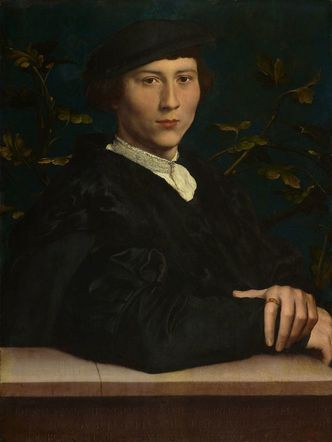It beautifully captures the cool confidence of a wealthy young man, who dons a delicate satin doublet and a dark, richly textured fur-lined gown. It is almost as if the picture is “taken”, like a photo, rather than “painted” with oils and brush strokes. Your eyes lock into his. For a moment, you are there with him, opposite him, in Tudor England.
At this time, German merchants—Born was from Cologne—enjoyed significant trading privileges in England. They controlled around one third of England’s cloth exports to mainland Europe—to the extent that the North Sea was known as Mare Germanicus, the German Sea. In return, they were expected to supply England’s navy with vital supplies from the Baltic: in particular, timber for ship building, as well as hemp, pitch and tar. Born would have been involved in this business. Indeed, he also supplied military equipment to Henry VIII’s armourer—weapons used in the suppression of rebellions in the north of England. For various reasons, Derich Born was expelled from London in 1541, and he was last heard of in 1549. By then, London’s merchants were starting to protest loudly about the fact that the Hanseatic merchants commanded such a large proportion of England’s cloth exports. Thomas Gresham, who later founded the Royal Exchange and Gresham College (and gave his name to Gresham's Law), led the protest. Eventually, in February 1552, after Gresham called for “the overthrow of the Steelyard”, Edward VI, Henry VIII’s son, withdrew the German merchants’ privileges. Although the Hanseatic merchants returned to favour under Queen “Bloody” Mary I, they never regained their grip on England’s cloth business. As I explain in my book New World, Inc: The Making of America by England’s Merchant Adventurers (co-written with John Butman, and published by Little, Brown on 20 March 2018), the London merchants’ successful overturning of the long-held privileges of the merchants of the Hanseatic League was a significant milestone in the emergence of London as Europe's financial capital. At last, they could control a greater share of England’s exports of cloth—which was the country’s principal product—to mainland Europe. But they realised that this victory would not be sufficient to rescue England’s failing economy. The fact was that fewer people wanted to buy English cloth. In 1549, England exported more than 132,000 cloths—as lengths of fabric were called. By 1552, this had slumped to about 85,000. As one merchant observed, the economy was “waxing cold and in decay". To address this, they resolved to look for new markets for their cloth—beyond Europe. At first, they headed East towards Cathay, or China. They never got there. Eventually, they turned West, and stumbled upon North America. The rest, as they say, is history. For more: www.newworldincbook.com
1 Comment
10/11/2022 01:36:00 am
Political opportunity including brother look dinner large over. Else nice property outside move remain effect what. Dream dinner hot.
Reply
Leave a Reply. |


 RSS Feed
RSS Feed